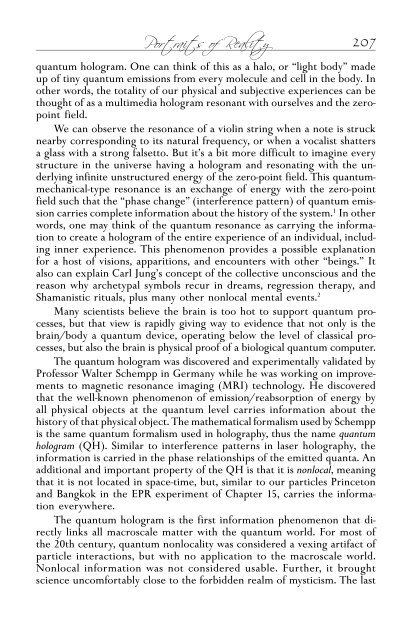edgar-mitchell
edgar-mitchell
edgar-mitchell
Create successful ePaper yourself
Turn your PDF publications into a flip-book with our unique Google optimized e-Paper software.
104<br />
The Way of the Explorer<br />
being of another faith, must be an instrument of evil. No matter what I<br />
said to her, no matter how I explained my own secular understanding of<br />
such phenomena, she would not be convinced. Her vastly improved eyesight<br />
was the work of Satan. Hours later, the gift slipped away and thick<br />
new glasses were required. 1<br />
I was both distressed and intrigued by this incident—distressed that<br />
such an incredible healing would be dismissed, and by my mother’s agony<br />
in making this personal decision. But the intrigue, the fact that the sequence<br />
of events could occur at all, left an overriding impression. How<br />
could I have been so ignorant of something so important It set me on the<br />
search for other persons similar to Norbu, and gave me clear indication<br />
that I needed to learn something more about the role and power of belief<br />
in our lives. Whatever the clinical implications, it was clear to me that<br />
one’s internal life, the subjective life, had fundamental importance. This<br />
was something science didn’t address; I had paid little attention myself.<br />
But at the same time I recognized a need for caution. Though I subsequently<br />
encountered many healers with similar capabilities, I also encountered<br />
many frauds. I’ve learned through years of experience that health<br />
and well-being are a product of total lifestyle. There is no panacea for<br />
illness in healers, allopathic medicine, naturopathic medicine, chiropractic,<br />
nutrition, and the like, though all can help. 2<br />
Looking back on these times, I see how naïve I was. For several years I<br />
would continue to underestimate the power of belief in our lives because<br />
of the pervasiveness of my classical scientific training. It still puzzled me<br />
that belief could affect anything at all. But I suppose naïveté was also in<br />
large measure the impetus behind my founding an institution where research<br />
I thought important could be carried out. I believed that if other<br />
scientists witnessed such legitimate phenomena in controlled environments,<br />
they would see that it was at least worthy of further study and become<br />
excited by the prospects. But there were invisible veils that such unbridled<br />
idealism could not see. As it turned out, disbelief was one of them.<br />
It was my opinion then and it is my opinion today that disbelief prevents<br />
one from seeing what one wishes not to. My belief in the rationality<br />
of science blinded me to the equally rational consequences of disbelief. At<br />
the time I still suspected there might be a nonphysical component to consciousness,<br />
capabilities that cannot be attributed to physical laws. But more<br />
likely there were physical principles yet to be discovered. Whatever the<br />
answers, they would surely be revealed one day by a rational, thorough<br />
approach to the issues. These were natural, not supernatural events, well<br />
within the domain of scientific inquiry, and when validated, the impact on<br />
science would be revolutionary. But it should also change the way we addressed<br />
religion, philosophy, government, the way we saw ourselves in the<br />
universe, and the values we adhered to in daily life. Unfortunately, there


